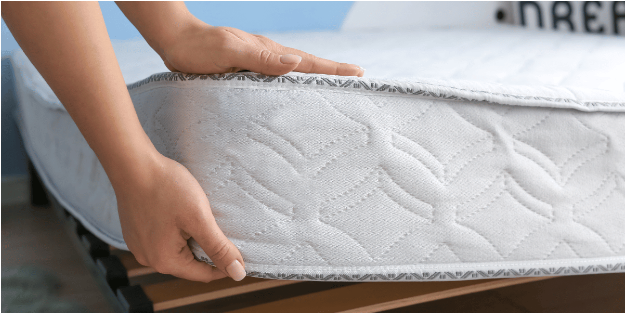
Mattress Firmness Guide
Finding the right mattress can make all the difference in your quality of sleep and the support your body has during your nightly rest. While there are multiple materials and design options you can choose from, one of the primary factors in your decision should ultimately be choosing the right mattress firmness.
Which level of mattress firmness is right for you is something that is a personal choice and is different for everyone. We all have our own preferences when it comes to what we like to sleep on. Luckily, there are some industry standards that you can look at to help you make your decision and find the perfect mattress firmness for you.
This guide is going to delve into everything you need to know about mattress firmness to help you make the right decisions for you so you can sleep in comfort each and every night.
What Is Mattress Firmness?
Before we delve into choosing the right mattress firmness, you need to know exactly what the firmness of a mattress actually means. Basically, it is how the mattress feels when you lie on it.
Are you sinking into a soft cloud enveloping your body, or are you lying on top, barely making a dent? Does the mattress support your body, or does it feel like you are sleeping on a hard surface?
All these questions and more are what you need to consider when looking at a mattress's firmness level. To make it easier, the industry has a scale of 1-10 to help you choose the right firmness and support for you.
A 1 on the scale would be a super soft mattress that feels like you are sleeping on air and is light underneath your body, allowing you to sink right in, while a 10 would be the hardest mattress and akin to sleeping on a hard floor, say, concrete. Typically, a 6.5 is the industry standard for medium firmness, which falls somewhere in the middle of still being soft for most people while offering more support than 1.
As the numbers move through a scale of 1-10, they are labeled as follows;
- Soft: 3
- Medium-soft: 4-5
- Medium: 6
- Medium firm: 6.5
- Firm: 7
- Extra firm: 8-10
However, the level of firmness shouldn’t be confused with the level of support as this, again, is a totally different thing, and firmness simply refers to how hard the mattress is under your body. And while it does offer levels of support, it mostly pertains to the comfort level.
Now we know the different firmness levels, this post will look into soft, medium, and firm mattresses in more detail.

Soft Mattresses
Soft mattresses will all measure around a 3-6 on the scale out of 10 for mattress firmness. A soft mattress will give you a feeling of sinking into the bed rather than lying on top of it and will typically allow for more contouring of the body and pressure relief too. In the industry, we refer to this difference as sleeping on the mattress (firm) versus sleeping in the mattress (plush)
As you will experience a high degree of contouring from a soft mattress, these are usually the go-to options for people who sleep on their side and need some additional support for their neck and shoulders when they sleep.
Generally speaking, soft mattresses will be constructed with thick sections of memory foam and other upholstery on their top layers or have quilted pillow tops on the surface to give you that soft, sinkable feeling.
If you’re in the market for a soft mattress that will offer you nightlong comfort and relaxation, you can check out our Wolf 14-inch Memory Foam Hybrid Plush Pillow Top Mattress and our Wolf 13-inch Memory Foam Hybrid Plush Comfort Mattress, which both offer unparalleled levels of comfort allowing you to sink and get a restful night’s sleep.
Still not sure if a soft mattress is for you? Then these pros and cons might help make up your mind.
Pros
- Easy to sleep on
- It can help to relieve pain and support joints
- Easier to move around
- It can help to align hips
- Ideal for light sleepers
Cons
- Softer mattresses can be more expensive due to the way they are constructed.
- Any remaining cons come down to preference.
An extra soft mattress will be a 3 on the firmness scale, while a soft medium will be closer to a 4-5.
Medium Firm Mattresses
Moving on up the scale, the medium-firm mattresses are set at a 6.5 on the scale for mattress firmness while the medium is 5; Sometimes called Cushion Firm. What this essentially means is that it's a solid middle-of-the-road kind of mattress that captures some of the qualities of a soft mattress while offering slightly more stability and support. A medium-firm mattress will combine a softer top layer with layers of support underneath, typically coils or high-density polyfoam or a combination of hybrid materials to offer advanced functions and features to the sleeper.
Medium firm mattresses will have some sinkage when you lie on them; usually, this will be around 2-3 cm unless you are of a heavier build, in which case this can be more. The same applies if there are two people sleeping on the mattress, you might experience deeper sinking.
Back sleepers or combination sleepers generally prefer medium-firm mattresses as they offer you more mobility during the night as you change positions and move around.
Again, like the soft mattress, the medium firm mattress has some appealing features and some drawbacks to think about.
Pros
- It provides less support for your joints as more pressure points are created, which causes joint pain,Joint pain is relieved by a softer surface feel. Like a plush.
- A wider variety of mattresses is available
- Ideal for a range of sleepers
- Responds to pressure and adjusts accordingly This is not a true statement.
Cons
- Not suitable for lightweight sleepers
- It may not offer enough comfort for heavier builds
Firm Mattresses
Heading to the top of the scale are your firm mattresses. These are the mattresses that are a 7 and above and offer you a higher level of wrong. They are just hard and unyielding.. The top layers of a firm mattress will generally have a softer foam level atop their layers of high-density poly foam or springs. (This is advice from the pre-1950’s and categorically incorrect. Firm and plush can provide correct support. Surface hardness and support are two independent axis that only overlap at the extremes.)
Choosing a firm mattress will make you feel like you are on a solid surface at first. However, this is down to the solid construction and pushback of the mattress to give This is incorrect. Too firm a mattress will cause your limbs to fall asleep, causing you to toss and turn to reopen closed capillaries and restore blood flow.
But why would anyone choose a mattress that feels hard? Again, this is down to preference, but for stomach sleepers or heavier sleepers, firm mattresses can offer an optimal sleeping experience as each part of the body is supported as they lie down. This support boosts better alignment and can often be more comfortable. Plus, if you get hot when you sleep, a very soft mattress might feel like you are being enveloped, increasing the heat during the night and making you warmer; a firmer mattress doesn't offer this and can be ideal for those looking to be cool at night.
Our Wolf 13-inch Memory Foam Hybrid Luxury Firm Mattress or Wolf 12-inch Memory Foam Hybrid Comfort Mattress are perfect for those who want to sleep on a sturdier base while still sleeping in comfort each and every night.
Again, like with the two options above, the higher the number, the firmer the mattress, and you can get an extra firm or a medium firm if you aren't sure about what you need or you want a bit less or more support during your sleep.
Pros
- Keeps proper body alignment, reducing aches and pains from sleeping
- Allow more unrestricted movement during the night and a more stable base.
- It may reduce stress levels.
Cons
- It is not ideal for those with chronic pain; it might not provide the cradling your body needs to reduce some aches and pain.
- It might require adjustments to find the right compromise if the mattress is too firm.
- Not suitable for light sleepers
Which Level of Mattress Firmness Is Best for Me?
You can use the guide above to help you determine where about on the scale you are likely to, but the firmness level isn't the only indicator you should be choosing a mattress for. But in a nutshell,
- Soft mattresses - anywhere up to a 4 on the re sleeping in their bed rather than lying on top of it. Soft is ideal for side sleepers.
- Medium - medium 5 to 7 on the scale. They tend to be more popular with people wanting to move around more in their sleep but still have the comfort and linkability of a softer mattress. Perfect for side and back sleepers
- Firm - a 7 or above are hard mattresses that offer, can help you stay cool when you sleep, support body alignment, and are the best choice for stomach or heavy sleepers.
To find the right level of support, it is best that you try out different mattresses in person to get a feel for how each one will be to sleep on.
Everyone is different and will find that different firmness levels suit their body and sleeping style. How you sleep, how you want your mattress to feel, the support you need, and the materials and features of each mattress will then come into play alongside the mattress firmness to assist you in making a more informed decision.
From here, you can look at your options once you have narrowed down your firmness level to get the perfect mattress for you.
Tips for Finding The Right Firmness Mattress
To find the perfect mattress for you, keep these tips in mind.
- Firmness and support are two completely different things, and you shouldn't base the support you need on the firmness level - firmness is for comfort.
- How you sleep should dictate the level of firmness you need; side sleepers can find softer and medium mattresses better for them. Side and back sleepers can get more comfort from a medium mattress, while stomach sleepers should opt for a firmer mattress.
- Factor in how much you move in your sleep and if you get warm overnight; if you answer yes to both of these points, then a medium-firm or a firm mattress might be best for you
- How much your weight should influence your firmness choice; heavy sleepers should opt for medium or hard mattresses, while slighter sleepers are better suited for soft to medium mattresses.
Finding the right mattress firmness for you is easier once you know what you are looking for and at how each mattress is scored. Being able to get the right level of support for your body while you sleep is a vital aspect of getting a good night's rest and relaxation.
Don't just pick any mattress for your nighttime activities; choose one that can give your body exactly what it needs and experience a deeper, more comfortable sleep thanks to the right mattress.
